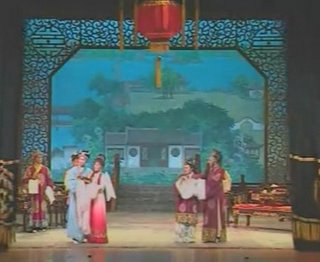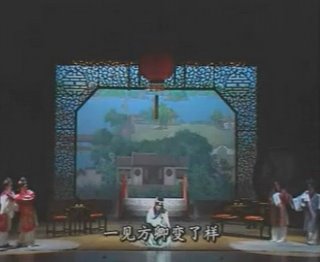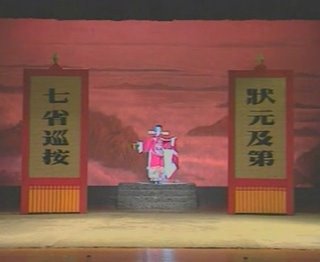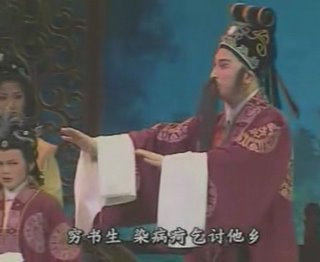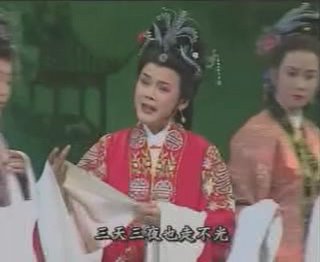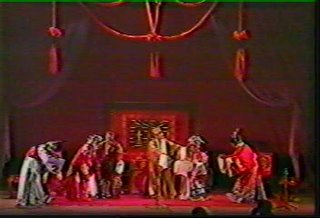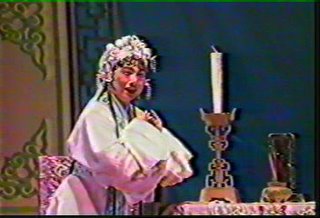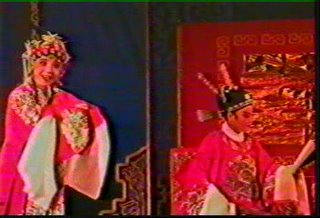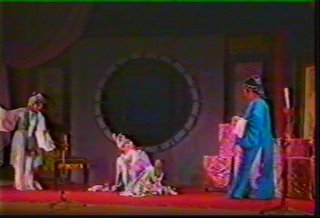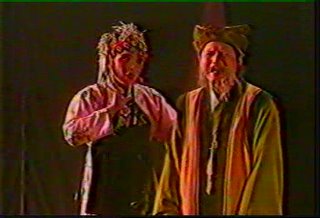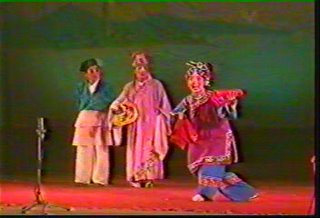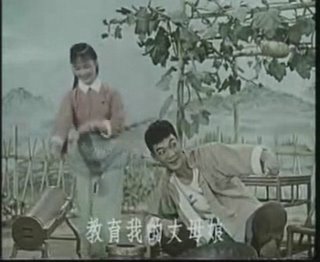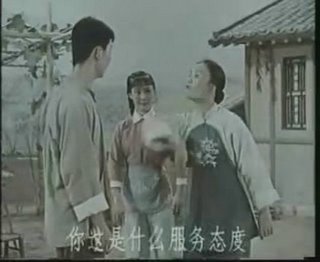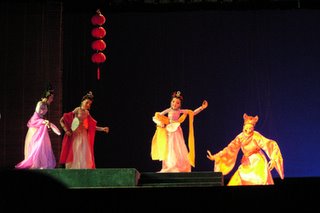 Title: The Royal Inspectorate (钦差大臣)
Title: The Royal Inspectorate (钦差大臣)Genre: Quanzhou String Puppetry (泉州提线木偶)
Format: Stage puppetry (live)
Production year: 19 December 2005
Director: Lv Zhong Wen, Wei Hong
Script: Wang Jingxian
Music: Lin Jiacai
Scenography: Huang Lianjin
Puppeteers: Chen Yinghong, Xia Rongfeng for Jia Si, Xu Runming, You Youya for Zhu Wu, Zhang Gong, Wu Weigong for Qian San, Huang Wenjun, Fu Ruifeng, Wu Weihong for Mrs. Qian, Meng Suping, Lin Xiaojun for Miss Qian, etc.
 At first glance...
At first glance... Quanzhou (string) Puppetry is a world renowned form of marionette art. In China, though there are other variations of marionette puppetry, this Quanzhou style of string puppetry is the most famous, and having only 1 professional troupe left in the whole of China makes this form of art even more rare and precious.
 Synopsis
Synopsis Jia Si, a down-and-out son of a rich man from the Imperial capital, had to resort to stealing food from the Zhao Xian Hall with his servant and was caught by the lady owner of the hall. She had them locked up in her room and called in the constables. At this same time, the Magistrate’s men were actually busy searching for the Royal Inspectorate, who was reported to have come to the town secretly under disguise. According to news, the Inspectorate was a tall skinny man and with him was his servant, a short and plump man. Jia Si and his servant happened to fit the description, was hence Jia Si was mistaken as the Inspectorate and was welcomed back to the Magistrate’s residence.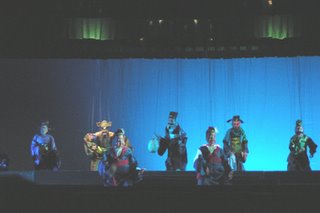 Magistrate Qian San and his gang of local authority officials were actually corrupted officials who have sucked money out of their own people. In order to protect themselves, they decided to get close to the “Inspectorate” and tried to bride him with treasures. Qian even get her daughter to seduce Jia Si so as to secure his official post. Miss Qian managed to charm Jia Si, and Qian forced them into wedding.
Magistrate Qian San and his gang of local authority officials were actually corrupted officials who have sucked money out of their own people. In order to protect themselves, they decided to get close to the “Inspectorate” and tried to bride him with treasures. Qian even get her daughter to seduce Jia Si so as to secure his official post. Miss Qian managed to charm Jia Si, and Qian forced them into wedding. On the wedding day, however, Jia Si disappeared all of a sudden, leaving behind a poem disclosing his real identity, as well as giving these corrupted officials a bad lashing. At this same time, the real Royal Inspectorate had arrived, sending them into panic once again!
On the wedding day, however, Jia Si disappeared all of a sudden, leaving behind a poem disclosing his real identity, as well as giving these corrupted officials a bad lashing. At this same time, the real Royal Inspectorate had arrived, sending them into panic once again!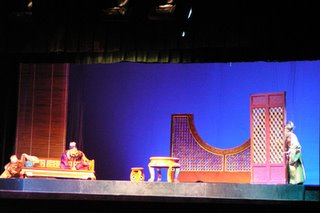 Review
Review
Puppetry is a form of art which one has to appreciate “live” and not through video or television. Somehow, the magical charm of this art form is lost through these technologies. I would say I’m lucky to be able to catch the Quanzhou Puppet Troupe on stage again after a lapse of over a decade. Although personally I still prefer their performances back then compared to now, I still feel that these puppeteers are really remarkable in their artistry. Marionettes are not easy to manipulate, especially with 30-odd 2-meter long strings! Typical puppetry requires the puppets to imitate the human movements. However for this show, not only did the puppeteers succeed in making the puppets behave very human-like, the director has also added some stunts unachievable by human (under normal circumstances). For example in scene 2, when Magistrate Qian heard that the Royal Inspectorate was going to arrive soon, he sprang up into the air and landed on top of the decorated windscreen on his tummy. This is of course not achievable by human standard, but in puppetry, it adds a sense of comic to the show.
Typical puppetry requires the puppets to imitate the human movements. However for this show, not only did the puppeteers succeed in making the puppets behave very human-like, the director has also added some stunts unachievable by human (under normal circumstances). For example in scene 2, when Magistrate Qian heard that the Royal Inspectorate was going to arrive soon, he sprang up into the air and landed on top of the decorated windscreen on his tummy. This is of course not achievable by human standard, but in puppetry, it adds a sense of comic to the show. The movement choreography was well done too. In scene 3, where Qian’s gang of local authority officials and their men were out hunting for the Royal Inspectorate, the puppeteers arranged the marionettes into different formations, changing from one to another in midst of their dialogues. Together with the exaggerated running movements of the marionettes, the scene was rather cute yet beautiful.
The movement choreography was well done too. In scene 3, where Qian’s gang of local authority officials and their men were out hunting for the Royal Inspectorate, the puppeteers arranged the marionettes into different formations, changing from one to another in midst of their dialogues. Together with the exaggerated running movements of the marionettes, the scene was rather cute yet beautiful.
For scenography, it’s a pity that some parts of the stage settings had to be “sacrificed” when they troupe came over. However, the set still looked quite elegant with its simplified props. What I like about the set was that they had incorporated some props with a modern feel into the scenes. Like in scene 2, there is this big windscreen in the shape of a copper coin (perhaps to hint that Magistrate Qian is a “money-faced” man) which can be rotated like a rotating door. In that scene, Magistrate Qian was hiding behind the windscreen from his fierce wife, and she pushed the windscreen around and caused Magistrate Qian to fall flat on the ground. Something innovative and funny!
This is by far one of the most enjoyable puppet shows so far. The script was quite well-written (adapted from a Russian play) and easy to understand, and the plot is funny and entertaining. The puppeteers are very skillful and they could sing quite well too. This is a highly recommended show, and if there were VCDs or DVDs for this show, I’ll be the first to buy it.
Ratings
Script
Music
Scenography
Puppetery Skills
Final rating
